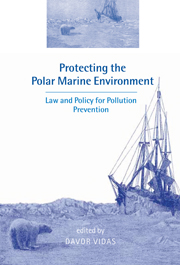Book contents
- Frontmatter
- Contents
- List of figures
- List of tables
- Notes on the contributors
- Preface and acknowledgements
- List of abbreviations
- INTRODUCTORY OVERVIEW
- PART I LEVELS OF REGULATION IN THE PROTECTION OF THE POLAR MARINE ENVIRONMENT
- PART II CURRENT TRENDS AND ISSUES IN PROTECTING THE POLAR MARINE ENVIRONMENT
- 8 Land-based marine pollution and the Arctic: polarities between principles and practice
- 9 Radioactive waste in the Barents and Kara Seas: Russian implementation of the global dumping regime
- 10 Regulation of navigation and vessel-source pollution in the Northern Sea Route: Article 234 and state practice
- 11 The emerging International Polar Navigation Code: bi-polar relevance?
- Index of international instruments and national legislation
- Subject index
9 - Radioactive waste in the Barents and Kara Seas: Russian implementation of the global dumping regime
Published online by Cambridge University Press: 12 August 2009
- Frontmatter
- Contents
- List of figures
- List of tables
- Notes on the contributors
- Preface and acknowledgements
- List of abbreviations
- INTRODUCTORY OVERVIEW
- PART I LEVELS OF REGULATION IN THE PROTECTION OF THE POLAR MARINE ENVIRONMENT
- PART II CURRENT TRENDS AND ISSUES IN PROTECTING THE POLAR MARINE ENVIRONMENT
- 8 Land-based marine pollution and the Arctic: polarities between principles and practice
- 9 Radioactive waste in the Barents and Kara Seas: Russian implementation of the global dumping regime
- 10 Regulation of navigation and vessel-source pollution in the Northern Sea Route: Article 234 and state practice
- 11 The emerging International Polar Navigation Code: bi-polar relevance?
- Index of international instruments and national legislation
- Subject index
Summary
During the 1990s, protection of the Arctic marine environment has attracted intense political attention, engaging diplomats, parliamentarians, researchers and non-governmental organisations across the Arctic rim – and well beyond. The disclosure of Soviet dumping of radioactive waste in the Barents and Kara Seas is among the main reasons for this. It is now clear that such dumping has been conducted for decades – by the Northern Fleet as well as by the civilian Murmansk Shipping Company, the operator of nuclear-run icebreakers in the Northern Sea Route. Measured at the time of disposal, the total radioactivity dumped into Arctic seas by the Soviet Union is twice as high as that of all previously known dumping worldwide. The most intensely radioactive type of waste stems from nuclear vessel reactors which still contain high-level spent fuel.
Parts of this dumping occurred in violation of Soviet commitments to the 1972 Convention on the Prevention of Marine Pollution by Dumping of Wastes and Other Matter (London Convention); this forms the point of departure for this chapter. In particular, we will focus on how international regimes may affect domestic implementation in member states. The core of the argument is that Soviet and later Russian management of nuclear waste in the north has been significantly influenced by regulations and programmes generated under international dumping instruments.
- Type
- Chapter
- Information
- Protecting the Polar Marine EnvironmentLaw and Policy for Pollution Prevention, pp. 200 - 220Publisher: Cambridge University PressPrint publication year: 2000
- 3
- Cited by



